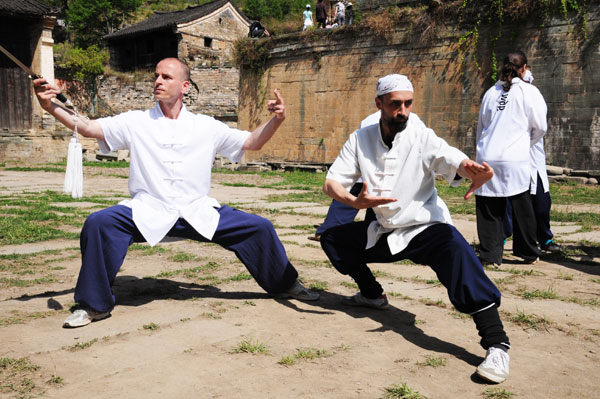Taoist Wudang Mountains lure foreigners
 0 Comment(s)
0 Comment(s) Print
Print E-mail China Daily, May 28, 2011
E-mail China Daily, May 28, 2011
On a sweltering afternoon, a group of Europeans in traditional white Chinese shirts and dark baggy pants sit in a big circle on a lawn meditating. After about half an hour, they start to practice tai chi in pairs, pushing each other's hands.
They are from the Wudang Five Dragons Tai Chi School in the Wudang Mountains, Central China's Hubei province. The mountains attract tens of thousands of foreign kungfu fans every year, not only for its deep Taoism culture but also for its legendary Wudang tai chi martial arts.
Unlike other kungfu schools in Wudang, the two teachers are both German, rather than Chinese.
"With other schools and teachers, it's difficult for students to understand because most Chinese kungfu masters don't speak English," says the 34-year-old Norman Torok.
 |
|
Norman Torok (L) and Ismet Himmet, both from Germany, practice tai chi at the Five Dragons Palace in the Wudang Mountains, Central China's Hubei province, April 23. [China Daily] |
Established this year, the school recruited its first group of 20 students in April from such countries as Germany and Greece. The tuition is 500 euros ($710) per month including accommodation and food, and there is a discount for long-term learners.
They live in simple bungalows near the Five Dragons Palace, one of eight sacred palaces in the Wudang Mountains.
The palace fell into disrepair and is being rebuilt. As the only highway to the palace is not open to traffic, few people bother to walk for more than one hour for a visit.
"The Five Dragons Palace is one of the oldest temples here. Moreover, it is much quieter compared with other temples which are open to tourists," says Ismet Himmet, another teacher with the school.
Himmet and Torok call their one-year training 'Wudang Principles' as they think the knowledge behind the forms of tai chi is always about the principles. Both of them were martial arts trainers in Berlin's Wudang Academy.
Himmet has studied martial arts such as karate and tae kwon do since 1985. In 2000, he went to the famous Shaolin Temple to learn kungfu.
A year later, he came to the Wudang Mountains, where he became obsessed with tai chi. For a better understanding of tai chi, he stayed and started to learn Chinese.
He says that many schools only teach basics and forms, but no application, which is the most important part.
"The movement of tai chi is slow, but its application can be very fast in fighting," he says.
"Wudang is like my second hometown. I go back to Berlin on holidays, but I really miss Wudang, as the remoteness and tranquility are good for my qigong," he says.
Unwilling to tell his age, he says that Taoists have no age as their pursuit is longevity.
Most of the students have studied kungfu before their trips to China. They get up at 5 am, line up after 30 minutes and begin their nine-hour training of basic exercises, forms and applications. In the qigong (Chinese breathing exercise) class, everyone has to find a place of his or her own in the forest and practice qigong there for about one and a half hours.
Among them is Julia Marquardt, a girl in her 20s from Germany, who has studied tai chi for about two years. She shares a dorm with double deck beds with three other women. In the men's room, there are more than a dozen students.
They can only eat vegetarian food in the school and there are only simple squat toilets.
"To practice Taoism and learn kungfu, one has to go through some hardships. A horse-riding stance is a basic stance in kungfu. So it's not so difficult," says the teacher Himmet.
He says that a mosquito net is necessary in summer and there are snakes in the dormitory, but they don't bite.
The students can't have regular showers due to the unstable supplies of water and electricity in the mountains.
Weekends are free and many of them go to a town on the foot of the mountains and stay for one night to enjoy a shower and outside life. Marquardt walks about three hours to the town once a week, to send e-mails to her parents and friends.
"I am not only interested in the traditional martial art of tai chi, but also in Taoism. I think learning tai chi is a good way to understand Taoism. As the birthplace of Taoism, China is an even better place than Germany," she says.
"I like the mountains very much. They are like the attendant spirit who is protecting me. Whenever I have problems, I will walk in the mountains, and my worries just fly away and I feel good again," she says.





